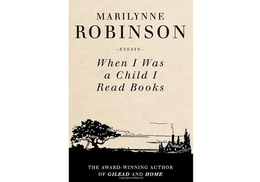Archbishop's review of 'When I Was a Child I Read Books'

Friday 10th August 2012
In an article published in the Church Times, Archbishop Rowan Williams reviews Marilynne Robinson's 'When I Was a Child I Read Books'.The Archbishop's review follows in full.
There have been ripples of controversy recently in the national press over the definition of the word "liberal". In the UK, it tends simply to be shorthand for a set of progressive orthodoxies vaguely grounded in the Enlightenment, focused on choice and autonomy, and suspicious of tradition as something that could ever settle disputes. But it doesn't here have, even in the mouths of its critics, quite the diabolical flavour it is usually given in the conservative rhetoric of North America. What Marilynne Robinson's collection of essays does is to cut through both the conservative and the non-conservative uses of the word, and to seek to restore a very much richer meaning to it.
These essays are pure gold. Written with all her usual elegance, economy, and intellectual ruthlessness, they constitute a plea for recovering the use of "liberal" as an adjective, and, what is more, an adjective whose central meaning is specified by its use in scripture. "The word occurs [in the Geneva Bible] in contexts that urge an ethics of non-judgmental, nonexclusive generosity" - and not a generosity of "tolerating viewpoints" alone, but of literal and practical dispersal of goods to those who need them.
Psalm 122 is, you could say, the theme song of this vision, and it is a vision that prompts Robinson to a ferocious critique of the abstractions of ideology - including "austerity" as an imperative to save the world for capitalism. She offers a striking diagnosis of the corrupting effect of rationalism: rationalism as she defines it is the attempt to get the world to fit the theory; and because the world is never going to fit the theory, the end-product of rationalist strategies is always panic.
"Rationalism is the omnium-gatherum of resentment and foreboding", whereas reasonableness is interested in "things as they come". The economic crisis is, in this sense, the nemesis of one kind of rationalism, oblivious of the actual complexity of people's motivation.
Where do we find the reasonable rather than the rationalistic? Above all, in the various ways in which we are educated in "imaginative love for people we do not know or whom we know very slightly"; in a broadly conceived, long-term commitment to building this kind of loving understanding - in fact, in what has often been called a "liberal education".
She celebrates, in many of these pieces, the legacy of communal investment in university education, dusting off some of the forgotten history of the American Mid-West in its most creative period, the mid-19th century. She identifies herself proudly as a product of this legacy, formed by a serious, morally literate, imaginatively bold Protestant culture.
Readers of her earlier essays will recognise the passionate defence of Calvin as a learned and "liberal" humanist, capable of celebrating the scientific skills of human beings as a sign of their God-given dignity. As in her recent Terry Lectures at Yale, published as Absence of Mind, Robinson points up the irony of using this scientific sophistication to dismantle the very ideas of consciousness and liberty.
Whether she is defending public investment in both welfare and universities, exposing the plain mean-spiritedness and self-righteousness that lurks beneath rather a lot of language about austerity (usually the kind imposed on other people), or dismantling the historical nonsense and, indeed, the unthinking anti-Semitism of some supposedly "liberal" theological modernists, she is invariably clear, and often irresistibly quotable.
She has no patience with fashionable complaints about the responsibility of biblical texts or historic doctrine for violence or prejudice - Bishop Spong, Gerd Lüdemann, and, for that matter, Adolf von Harnack and Julius Wellhausen, get short shrift for their dismissals of the faith and ethics of the Pentateuch. As she insists, the biblical record is distinctive in that it gives us the tools for its own spiritual and moral critique; it is a story not of triumphant obedience to the law, but of failure and dogged recovery through forgiveness.
She is a bit hard on some serious interpreters such as Regina Schwartz, who in fact allow far more nuance to their criticisms than the more familiar and journalistic authors she castigates. But she makes a magnificent case for Mosaic ethics as the decisive example of "liberal" thinking in her own sense.
The book is a breath of fresh air, the testimony of one of the world's most compelling English-speaking novelists to her debt to both the best of American communitarian ethics and an orthodox Reformed theology remarkably free from obsessive moralism, while remain-ing toughly and subtly moral in all sorts of ways.
Despite the North American focus of the discussions, the parallels with our situation are obvious enough. Robinson's is a voice we urgently need to attend to in both Church and society here.
© Rowan Williams 2012
When I Was a Child I Read Books is published by Virago (978-1-84408-771-6)
